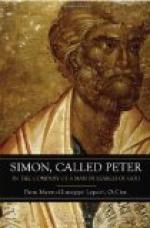She gave a little laugh. “’Ow should I say?” she said. “But you think God not remember you, and, Peterr, He remember all the time.”
“And Julie?” quizzed Peter after a moment.
Louise shrugged her shoulders. “This love,” she said, “it is one great thing. For us women it is perhaps the only great thing, though your English women are blind, are dead, they do not see. Julie, she is as us, I think. She is French inside. La pauvre petite, she is French in the heart.”
“Well?” demanded Peter again.
“C’est tout, mon ami. But I am sorry for Julie.”
“Louise,” said Peter impulsively, “you’re better than I—a thousand times. I don’t know how to thank you.” And he lifted her hand to his lips.
He hardly touched it. She sprang up, withdrawing it. “Ah, non, non,” she cried. “You must not. You forget. It is easy for you, for you are good—yes, so good. You think I did not notice in the street, but I see. You treat me like a lady, and now you kiss my hand, the hand of the girl of the street.... Non, non!” she protested vehemently, her eyes alight. “I would kiss your feet!”
Outside, in the darkened street, Peter walked slowly home. At the gate of the camp he met Arnold, returning from a visit to another mess. “Hullo!” he called to Peter, “and where have you been?”
Peter looked at him for a moment without replying. “I’m not sure, but seeing for the first time a little of what Christ saw, Arnold, I think,” he said at last, with a catch in his voice.
CHAPTER IV
Looking back on them afterwards, Peter saw the months that followed as a time of waiting between two periods of stress. Not, of course, that anyone can ever stand still, for even if one does but sit by a fire and warm one’s hands, things happen, and one is imperceptibly led forward. It was so in this case, but, not unnaturally, Graham hardly noticed in what way his mind was moving. He had been through a period of storm, and he had to a certain extent emerged from it. The men he had met, and above all Julie, had been responsible for the opening of his eyes to facts that he had before passed over, and it was entirely to his credit that he would not refuse to accept them and act upon them. But once he had resolved to do so things, as it were, slowed down. He went about his work in a new spirit, the spirit not of the teacher, but of the learner, and ever since his talk with Louise he thought—or tried to think—more of what love might mean to Julie than to himself. The result was a curious change in their relations, of which the girl was more immediately and continually conscious than Peter. She puzzled over it, but could not get the clue, and her quest irritated her. Peter had always been the least little bit nervous in her presence. She had known that he never knew what she would do or say next, and her knowledge had amused




